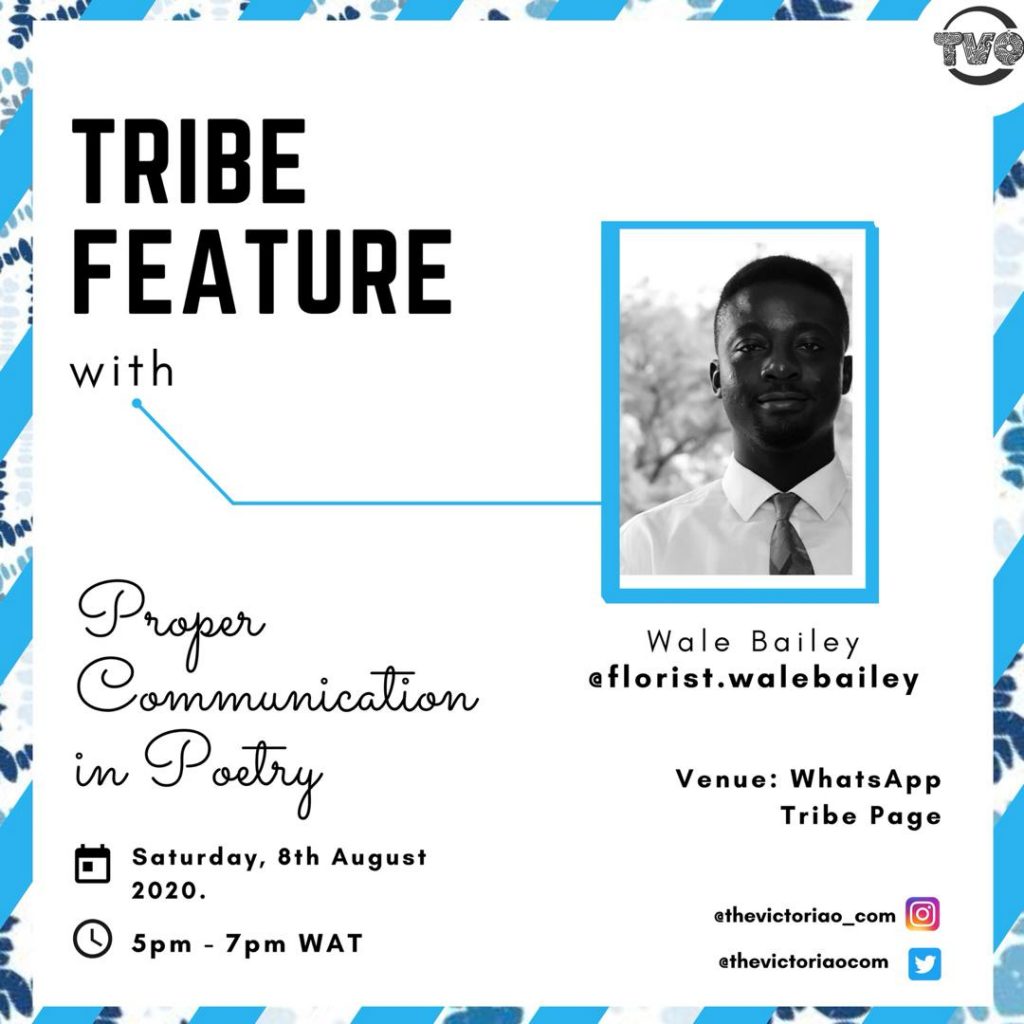Compiled by : Orjighjigh Alôm

We had an amazing time with Wale Bailey on Saturday! What an awesome poet! And we know, regrettably, that quite a few persons would have loved to be in attendance. Not to worry, we put together the entire class again for you! Isn’t that delightful? For your reading and learning pleasure, we present : Proper Communication in Poetry. Enjoy!
Good evening, everyone. I’m Wale Bailey and I will be sharing from my experience on “Proper Communication in Poetry.” I’m honored to be amongst you all.
I would love us to look at each word in that sentence in laymen terms. Proper (would mean the right way of doing things); communication (is a means of expressing yourself to yourself or to others with the aim of being understood); and poetry (what is poetry? I bet this has as many definitions as the number of poems that exist. Everyone has their personal definition of poetry). But for this session I would use Tom Gunn’s definition of poetry: “My old teacher’s definition of poetry is an attempt to understand.” That’s my personal definition of poetry.
Basically what we are talking about today is the “right way to communicate with ourselves and to others through poetry.” Your right way to communicate is subjective; depending on who you are and who you are communicating with. You pick your style based on your configuration, based on who are, what you like and what you want to say. There is no hard and fast rule to it. You need to decide who your audience is; who is this poem meant for? What’s their exposure level? What’s their interest? What’s their personality like? When you have a fair idea of these, it would guide your communication.
You know we have the use of poetics tools, imagery, “the show, don’t tell” and other things that the academics look out for in a poem: style, structure, form and the likes. To start with, in order to communicate well, you must have been communicated to well. What are you reading? What do you love to read? Who do you love to read? All these constitute your style and all these would determine what you read and what you would like to communicate.
When I started my fascination for poetry, I loved sweet poems, easy poems. Like, for Christ’s sake don’t burst my head, I’m not playing chess, I’m reading poetry. So I favored the Mary Olivers, the Jane Hirshfields, Khalid Mattawa and the likes. After reading their poetry for quite a while, it was obvious that I started writing like them. Then I met folks who studied English, who had degrees in English Language. And when I showed them my works, they said I wrote narrative poetry. That I favored contemporary poetry with a lot of storytelling. They also said my metaphors were weak, that I had to improve on my imagery. And I’m pretty sure if I show them the poems I love and read they might have the same comments on it so I wasn’t bothered.
I have a friend who writes poetry I find hard to understand. I bought his books when they came out but he ended up having to explain most of his poems to me. I found [his poems] hard to understand, but others understood his poems. So will he change his poetry style because I usually find it hard to understand? No, he wouldn’t. He would express himself with his most preferred style and those who like it will read it. Those who can’t will keep reading till they find the genre they love and they will read it.
I have another friend who writes poetry that rhymes. Personally, I think his rhyming is forced and unnatural so I don’t enjoy it. But he has folks who love that style; they read it and they buy his books. So in his way he is communicating to his people. So we have a lot of proper ways of communication as you have the various styles that exist. You have your style, I have my style (we can learn the rules of poetry, copy a style for a while). If we would be fair to ourselves, it’s advisable we write with our style.
“It took me four years to paint like Raphael, but a lifetime to paint like a child.” – Pablo Picasso
You could change the ‘paint’ to ‘write.’
Then we have this: why are you writing poetry? Is it for yourself? Is it to compete for an award? Is it for those who can understand your style? Or is it to make income? These would also determine how you communicate. If I’m writing for myself, I just express myself in ways I can understand without caring about any other person. If I’m writing for an award, I would check the checklist and observe how previous writers that won the award write, learn the process and write. If I’m writing for those that can understand my style, I keep at it. If I’m concerned about making income, I would have it in mind that I have to employ strategies that would allow more people to be interested in poetry than the usual. I would be breaking a lot of academic rules, I would be using simple, relatable metaphors and similes.
I remember the year Rupi Kaur was tagged the poet of the year and a lot of my friends said she was not worthy. Whether she was or not, she had reached out to some folks, to a lot of folks that might naturally not read poetry; because they have this feeling that poetry is “hard” and for the “elite”. Poetolu has that vibe too with his poems.
The art of proper communication in poetry is something you have the rest of your days on earth to learn because with each day, you keep discovering yourself: who you are, what you love, and how to express it. To communicate properly in poetry doesn’t mean you will eventually communicate to everyone who likes poetry. This is because different people have different definitions of what poetry is. To communicate well, learn and discover your style. Be intentional about it. Be intentional about what you love to read, and what you love to write. Also know why you love to write, who your audience is. If you are clear on all these, you would at least be sure that you are consciously communicating as clear as you intend to.
As you can see, the art of proper communication is ultimately left to you to discover, it’s not for me to tell you. It might be for me to show you but, at long last, you have to find it, choose it and work with it yourself. I believe poetry is beyond talent; it’s interest, hard work, writing, re-writing. It’s intentional, experimental, explosive and continuous.
In summary, to communicate well:
• know your style;
• work on improving your style;
• be clear on why you are writing, and
• who you are writing for.
Thank you everyone. It was great to be here. This is the best I can do for two hours. I look forward to reading your poems. You can tag (@poetrytuesday) on Instagram or (@poetrytuesdayy) on Twitter. That way I get to see your write-ups.
Thank you, bye.
How awesome was that?! Tell us what you think in the comments section


